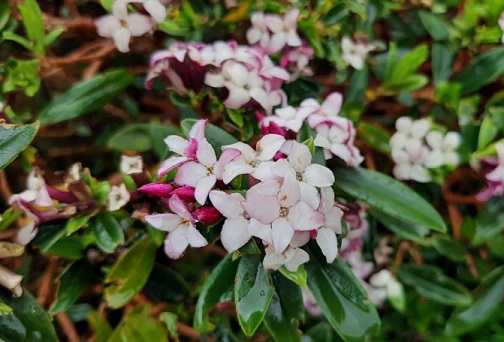The Phytochemical Daphnetin Can Protect Against COVID-19 by Downregulating ACE2 Expression
Nikhil Prasad Fact checked by:Thailand Medical News Team Dec 28, 2024 3 months, 2 days, 11 hours, 17 minutes ago
Medical News: The COVID-19 pandemic has posed unprecedented challenges to global health systems, economies, and societies. As SARS-CoV-2, the virus responsible for COVID-19, continues to mutate and evade immunity, researchers are searching for novel ways to prevent infections. A promising breakthrough comes from a team of scientists led by researchers at the School of Life Sciences, Shanghai University, and Wannan Medical College in China. Their groundbreaking study reveals that the phytochemical daphnetin, derived from the genus Daphne, can downregulate ACE2 expression, providing a novel method to protect against SARS-CoV-2.
 The Phytochemical Daphnetin Can Protect Against COVID-19 by Downregulating ACE2 Expression
The Phytochemical Daphnetin Can Protect Against COVID-19 by Downregulating ACE2 Expression
Image: The Daphne Tangutica Plant (A rich source of Daphnetin)
What Is Daphnetin?
Daphnetin is a coumarin phytochemical derivative isolated from plants belonging to the genus Daphne. Known for its diverse medicinal properties, daphnetin has long been used in traditional medicine for its anti-inflammatory, antioxidant, and vasoprotective effects. This
Medical News report explores how researchers have now identified daphnetin’s potential as a preventive agent against COVID-19 by targeting a critical receptor - ACE2 - which facilitates the virus’s entry into human cells.
The Role of ACE2 in COVID-19
The angiotensin-converting enzyme 2 (ACE2) is a receptor located on the surface of cells in the respiratory tract. It plays a vital role in regulating blood pressure but also serves as the primary entry point for SARS-CoV-2. When the virus binds to ACE2 through its spike protein, it gains access to human cells, leading to infection.
Previous studies have highlighted that reducing ACE2 expression could lower susceptibility to COVID-19. This approach holds particular promise for combating highly transmissible variants of SARS-CoV-2, which continue to emerge and challenge vaccine efficacy. Against this backdrop, researchers screened natural compounds to identify substances capable of safely downregulating ACE2 expression. Their efforts pinpointed daphnetin as a standout candidate.
The Study’s Key Findings
The research team, composed of scientists from institutions including Shanghai University and Wannan Medical College, conducted extensive experiments to evaluate daphnetin’s effects on ACE2 expression. These experiments spanned cellular, animal, and preliminary human studies. Below are the critical findings:
1. Screening Natural Compounds
Using a library of natural products, the team screened compounds for their ability to inhibit ACE2 expression. Among these, daphnetin emerged as a potent inhibitor. The compound significantly reduced ACE2 mRNA and protein levels in PC9 cells, a respiratory cell line with high ACE2 expression.
2. Mechanism of Action
Daphnetin’s effectiveness stems from its dual mechanism of action. It inhibits two critical pathways that regulate ACE
2 expression:
-HIF-1α Pathway: Daphnetin binds to the HIF-1α protein, a transcription factor that promotes ACE2 expression under hypoxic conditions. By inhibiting HIF-1α, daphnetin prevents the transcription of ACE2.
-JAK2/STAT3 Pathway: Daphnetin also targets the JAK2 protein, disrupting its ability to activate STAT3. This interruption halts ACE2 transcription, further reducing its expression.
3. Efficacy in Cell Cultures
Cellular experiments demonstrated that daphnetin significantly decreased ACE2 levels on the surface of PC9 cells. This reduction in ACE2 corresponded to decreased susceptibility of these cells to SARS-CoV-2 pseudovirus infection.
4. Animal Studies
In mice, oral administration of daphnetin at therapeutic doses reduced ACE2 expression in lung tissue. Immunofluorescence staining confirmed lower ACE2 protein levels in the respiratory system. These findings suggest that daphnetin could effectively mitigate viral entry in vivo.
5. Human Trials
Preliminary human studies involved six volunteers from Wannan Medical College who were administered daphnetin at standard therapeutic doses for five days. Nasopharyngeal swabs collected during and after treatment revealed a significant reduction in ACE2 expression in the nasal epithelium, a primary site of SARS-CoV-2 infection. Importantly, daphnetin was well-tolerated with no reported adverse effects.
Advantages of Daphnetin as a Preventive Agent
Daphnetin offers several advantages over conventional preventive measures like vaccines and monoclonal antibodies. Its ability to target host-cell pathways ensures efficacy against SARS-CoV-2 variants, which often evade immunity by mutating their spike protein. Additionally, daphnetin is:
-Safe: With over 40 years of clinical use in China, daphnetin has a well-established safety profile.
-Affordable: As a natural product, daphnetin is cost-effective to produce.
-Convenient: The compound is orally administered, making it suitable for widespread use.
-Broadly Applicable: Daphnetin’s mechanism of action is unaffected by viral mutations, offering consistent protection.
Implications for COVID-19 Prevention
The findings underscore daphnetin’s potential as a powerful tool in the fight against COVID-19. By reducing ACE2 expression, it could serve as a complementary strategy to vaccines and therapeutics. Vulnerable populations, such as the elderly and immunocompromised, stand to benefit significantly from this approach.
Conclusion
In conclusion, the study highlights daphnetin’s unique ability to downregulate ACE2 expression through dual inhibition of the HIF-1α and JAK2/STAT3 pathways. This dual mechanism not only reduces susceptibility to SARS-CoV-2 but also positions daphnetin as a robust preventive agent against emerging variants. The research team’s multi-faceted approach - spanning cell culture, animal models, and human studies - provides compelling evidence for daphnetin’s efficacy and safety.
Daphnetin’s affordability, safety, and ease of administration make it an attractive candidate for large-scale deployment, particularly in regions with limited access to vaccines or high infection rates. Future clinical trials will be crucial to confirm these findings and pave the way for regulatory approval. As the world continues to grapple with COVID-19, innovations like daphnetin offer hope for more effective prevention strategies.
The study findings were published in the peer-reviewed journal: Scientific Reports.
https://link.springer.com/article/10.1038/s41598-024-79734-z
For the latest COVID-19 News, keep on logging to Thailand
Medical News.
Read Also:
https://www.thailandmedical.news/news/herbs-and-phytochemicals-in-vitro-and-silico-studies-shows-potential-of-olive-leaves-extract-as-an-antiviral-against-sars-cov-2
https://www.thailandmedical.news/news/herbs-and-phytochemicals-harringtonine-from-cephalotaxus-fortunei-inhibits-sars-cov-2-and-exhibits-excellent-lung-pharmacokinetic-properties
https://www.thailandmedical.news/articles/herbs-and-phytochemicals
https://www.thailandmedical.news/articles/covid-19-herbs
